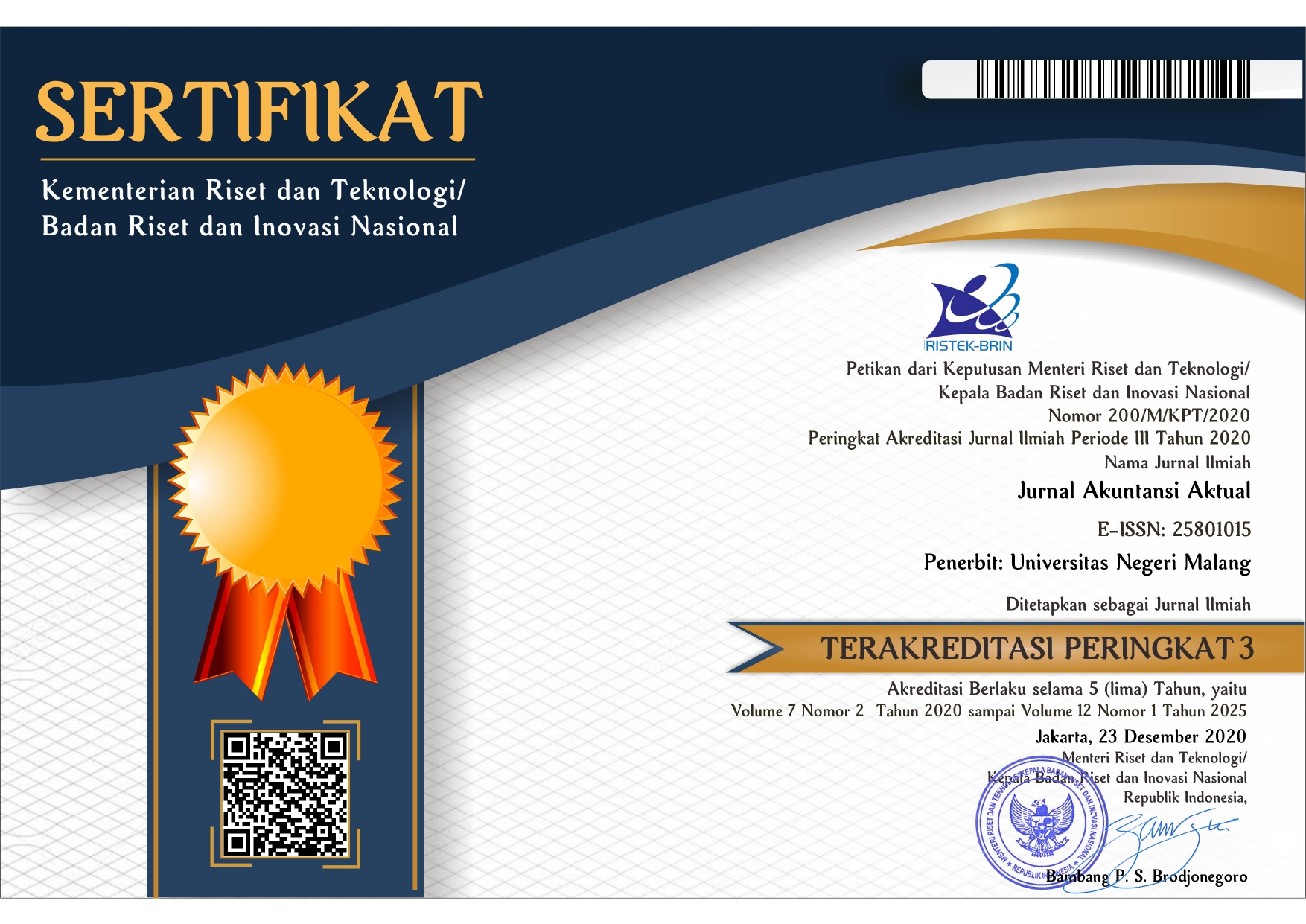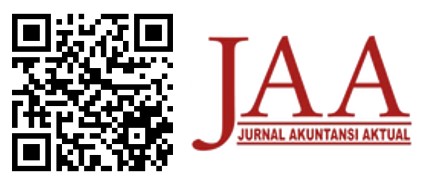Accountant Skill Gen Z Fresh Graduates in Digital Era: A Systematic Literature Review
Abstract
Method: The present study builds on a systematic literature review of 41 academic articles published in Scopus Database between 2017 and 2024. It is based on the “preferred reporting items for systematic reviews and meta-analyses” (PRISMA) method. Synthesising research through a transparent, rigorous and replicable process makes it possible to explore and identify accountant skill in digital era.
Findings: The findings highlighted the need for accountants to possess digital literacy skills, data analytics skills, and the ability to work collaboratively with professionals from other fields. The study also emphasized the importance of continuous professional development to keep pace with the rapid technological advancements in accounting.
Originality/Value: This paper offers a comprehensive literature review on impact of emerging technologies on the skills required for accountants in the digital era, particularly focusing on the skills needed by Gen Z fresh graduates. It could provide a insight and guidance for accounting fresh graduate to possess digital literacy skills, data analytics skills, and soft skills to adapt to technological changes and meet the needs of the dynamic accounting industry.
Keywords
Full Text:
PDFReferences
Allmann, K., & Blank, G. (2021). Rethinking Digital Skills in the Era of Compulsory Computing: Methods, Measurement, Policy and Theory. Information, Communication & Society, 24(5), 633–648. https://doi.org/10.1080/1369118X.2021.1874475.
Arquero, J. L., Fernandez-Polvillo, C., & Hassall, T. (2022). Non-Technical Skills and Students’ Overconfidence in Accounting. Education + Training, 64(5), 716–733. https://doi.org/10.1108/ET-08-2021-0309.
Asabeh, S. A., Alzboon, R., Alkhalaileh, R., Alshurafat, H., Amosh, H. A. (2023). Soft Skills and Knowledge Required for a Professional Accountant: Evidence from Jordan. Cogent Education, 10(2), 1-20. https://doi.org/10.1080/2331186X.2023.2254157.
Asonitou, S., & Hassall, T. (2019). Which Skills and Competences to Develop in Accountants in a Country in Crisis?. The International Journal of Management Education, 17(3), 1-19. https://doi.org/10.1016/j.ijme.2019.100308.
Bonollo, E. (2023). Negative Effects of the Adoption of Accrual Accounting in the Public Sector: A Systematic Literature Review and Future Prospects. Journal of Public Budgeting, Accounting & Financial Management, 35(6), 1–27. https://doi.org/10.1108/JPBAFM-06-2022-0097.
Chaplin, S. (2017). Accounting Education and the Prerequisite Skills of Accounting Graduates: Are Accounting Firms’ Moving the Boundaries?. Australian Accounting Review, 27(1), 61–70. https://doi.org/10.1111/auar.12146.
Coady, P., Byrne, S., & Casey, J. (2018). Positioning of Emotional Intelligence Skills within the Overall Skillset of Practice-Based Accountants: Employer and Graduate Requirements. Accounting Education, 27(1), 94–120. https://doi.org/10.1080/09639284.2017.1384741.
CPA Australia. (2019). CPA Australia’s My Firm. My Future. Report. https://www.cpaaustralia.com.au/public-practice/public-practice-research/my-firm-my-future-report.
Crawford, V., Brimble, M., & Freudenberg, B. (2024). Can Work Integrated Learning Deliver Employability? International Post‐Graduate Accounting Students. Accounting & Finance, 64(1), 1061–1082. https://doi.org/10.1111/acfi.13182.
Daff, L. (2021). Employers’ Perspectives of Accounting Graduates and their World of Work: Software Use and ICT Competencies. Accounting Education, 30(5), 495–524. https://doi.org/10.1080/09639284.2021.1935282.
de Lange, P., O’Connell, B. T., Tharapos, M., Beatson, N., & Oosthuizen, H. (2023). Accounting Graduate Employability: Employer Perspectives on Skills and Attributes of International Graduates. Accounting Education, 32(3), 249–277. https://doi.org/10.1080/09639284.2022.2059383.
Dolce, V., Emanuel, F., Cisi, M., & Ghislieri, C. (2020). The Soft Skills of Accounting Graduates: Perceptions versus Expectations. Accounting Education, 29(1), 57–76. https://doi.org/10.1080/09639284.2019.1697937.
Franke, F., & Hiebl, M. R. W. (2023). Big Data and Decision Quality: The Role of Management Accountants’ Data Analytics Skills. International Journal of Accounting & Information Management, 31(1), 93–127. https://doi.org/10.1108/IJAIM-12-2021-0246.
IMA. (2023). IMA Management Accounting Competency Framework. https://www.imanet.org/career-resources/management-accounting-competencies.
Imjai, N., Aujirapongpan, S., & Mahadi, N. (2023). The Interplay of Digital and Management Accounting Competency to Competitive Performance in the Open Innovation Era: A Case of Thai Micropreneurs. Journal of Open Innovation: Technology, Market, and Complexity, 9(4), 1-13. https://doi.org/10.1016/j.joitmc.2023.100167.
Jackson, D., Michelson, G., & Munir, R. (2022). New Technology and Desired Skills of Early Career Accountants. Pacific Accounting Review, 34(4), 548–568. https://doi.org/10.1108/PAR-04-2021-0045.
Jackson, D., Michelson, G., & Munir, R. (2023). Developing Accountants for the Future: New Technology, Skills, and the Role of Stakeholders. Accounting Education, 32(2), 150–177. https://doi.org/10.1080/09639284.2022.2057195.
Kokina, J., & Blanchette, S. (2019). Early Evidence of Digital Labor in Accounting: Innovation with Robotic Process Automation. International Journal of Accounting Information Systems, 35, 1-13. https://doi.org/10.1016/j.accinf.2019.100431.
Kokina, J., Gilleran, R., Blanchette, S., & Stoddard, D. (2021). Accountant as Digital Innovator: Roles and Competencies in the Age of Automation. Accounting Horizons, 35(1), 153-184. https://doi.org/10.2308/HORIZONS-19-145.
Kroon, N., Alves, M. D. C., & Martins, I. (2021). The Impacts of Emerging Technologies on Accountants’ Role and Skills: Connecting to Open Innovation—A Systematic Literature Review. Journal of Open Innovation: Technology, Market, and Complexity, 7(3), 1-27. https://doi.org/10.3390/joitmc7030163.
Kwarteng, J. T., & Mensah, E. K. (2022). Employability of Accounting Graduates: Analysis of Skills Sets. Heliyon, 8(7), 1-9. https://doi.org/10.1016/j.heliyon.2022.e09937.
Manetti, G., Bellucci, M., & Oliva, S. (2021). Unpacking Dialogic Accounting: A Systematic Literature Review and Research Agenda. Accounting, Auditing & Accountability Journal, 34(9), 250–283. https://doi.org/10.1108/AAAJ-08-2020-4736.
Osmani, M., Hindi, N., Al-Esmail, R., & Weerakkody, V. (2017). Examining Graduate Skills in Accounting and Finance. Industry and Higher Education, 31(5), 318–327. https://doi.org/10.1177/0950422217721759.
Page, M. J., McKenzie, J. E., Bossuyt, P. M., Boutron, I., Hoffmann, T. C., Mulrow, C. D., Shamseer, L., Tetzlaff, J. M., Akl, E. A., Brennan, S. E., Chou, R., Glanville, J., Grimshaw, J. M., Hróbjartsson, A., Lalu, M. M., Li, T., Loder, E. W., Mayo-Wilson, E., McDonald, S., … Moher, D. (2021). The PRISMA 2020 Statement: An Updated Guideline for Reporting Systematic Reviews. The British Medical Journal, 372(71), 1-9. https://doi.org/10.1136/bmj.n71.
Parsons, S., Davidowitz, B., & Maughan, P. (2020). Developing Professional Competence in Accounting Graduates: An Action Research Study. South African Journal of Accounting Research, 34(2), 161–181. https://doi.org/10.1080/10291954.2020.1727080.
Phan, D., Yapa, P., & Nguyen, H. T. (2020). Accounting Graduate Readiness for Work: A Case Study of South East Asia. Education + Training, 63(3), 392–416. https://doi.org/10.1108/ET-02-2019-0036.
Roy, S. (2023). Graduate Readiness for a Professional Career in Accounting – An Investigation ff Employers’ Perspectives in Fiji. Pacific Accounting Review, 35(2), 314–335. https://doi.org/10.1108/PAR-06-2021-0087.
Senan, N. A. M., & Sulphey, M. M. (2022). Construction and Validation of the Employability Questionnaire for Accounting Graduates. Education + Training, 64(1), 141–159. https://doi.org/10.1108/ET-04-2021-0152.
Snyder, H. (2019). Literature Review as a Research Methodology: An Overview and Guidelines. Journal of Business Research, 104, 333–339. https://doi.org/10.1016/j.jbusres.2019.07.039.
Tsiligiris, V., & Bowyer, D. (2021). Exploring the Impact of 4IR on Skills and Personal Qualities for Future Accountants: A Proposed Conceptual Framework for University Accounting Education. Accounting Education, 30(6), 621–649. https://doi.org/10.1080/09639284.2021.1938616.
Vijai, C., Suriyalakshmi, S. M., & Joyce, D. (2019). The Blockchain Technology and Modern Ledgers through Blockchain Accounting. Adalya Journal, 8(12), 545-557. https://doi.org/10.2139/ssrn.3514501.
Zayed, L. M. M., & Othman, O. H. (2023). Effect of Blockchain Technology in Innovating Accountants’ Skills: A Multimethodology Study in the Industrial Companies Listed on the Amman Stock Exchange. Journal of Innovation and Entrepreneurship, 12(1), 1-15. https://doi.org/10.1186/s13731-023-00312-0.
Zhao, J. (2024). Study on the Role of Big Data Technology in Promoting the Transformation of Financial Accounting in the Digital Economy Era. Applied Mathematics and Nonlinear Sciences, 9(1), 1-13. https://doi.org/10.2478/amns.2023.2.01120.
DOI: http://dx.doi.org/10.17977/um004v11i22024p160
Refbacks
- There are currently no refbacks.

This work is licensed under a Creative Commons Attribution-ShareAlike 4.0 International License.
Jurnal Akuntansi Aktual is indexed by:











 orcid.org/0000-0002-8777-8338
orcid.org/0000-0002-8777-8338



